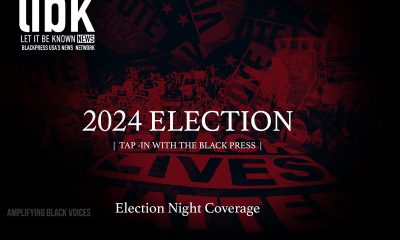#NNPA BlackPress
Congressional Health Subcommittee Considers Congresswoman Kelly’s MOMMA’s Act, Comprehensive Legislation Designed to Save Mothers’ Lives
CHICAGO DEFENDER — In an effort to address the gross disparity facing mothers of color, especially African American mothers, the MOMMA’s Act would expand access to culturally component care throughout the care continuum. Nationwide, African American mothers die at three-to-four times the rate of white mothers, but in Illinois, that disparity climbs to six times more likely to die.
Washington, DC – Today, the House Energy and Commerce Committee Subcommittee on Health held a hearing on America’s alarming maternal mortality rate and legislation designed to address this growing crisis. The Subcommittee examined four bills, including Congresswoman Kelly’s MOMMA’s Act.
“I appreciate Chairman Pallone and Chairwoman Eshoo prioritizing maternal mortality and holding this important hearing. In the last few decades, the risk of death for new American moms has doubled, while we’ve successfully driven down maternal mortality rates across the globe,” said Congresswoman Robin Kelly, chair of the Congressional Black Caucus Health Braintrust. “Each year, we are losing between 700 and 900 new moms and tragically more than half of these deaths are entirely preventable. Today’s hearing examined several high-quality proposals to reverse this troubling trend. I remain impressed and grateful to all of my colleagues for their efforts and focus on this issue.”
The MOMMA’s Act, introduced by Congresswoman Kelly and Senator Durbin, would enact a five-pronged approach to reduce maternal deaths:
- Establishing national obstetric emergency protocols through a federal expert committee,
- Ensuring dissemination of best shared practices and coordination amongst maternal mortality review committees,
- Standardizing data collection and reporting,
- Improving access to culturally competent care throughout the care continuum, and
- Expanding Medicaid coverage to new mom’s entire post-partum period, which is one year.
Many of the priorities of the MOMMA’s Act have been successfully implemented at the hospital, system, local and state levels. Maternal mortality review committees have been shown to sharply reduce deaths by learning from past tragedies. Likewise, the AIM Bundle, developed by Council for Patient Safety in Women’s Health Care, has actively reduced maternal mortality and morbidity through emergency protocols. It is also assisting in developing and sharing best shared practices that work to save lives.
Additionally, the MOMMA’s Act builds on the bipartisan Preventing Maternal Deaths Act, passed during the 115th Congress. The legislation took major steps toward standardizing and improving data collection and reporting.
In an effort to address the gross disparity facing mothers of color, especially African American mothers, the MOMMA’s Act would expand access to culturally component care throughout the care continuum. Nationwide, African American mothers die at three-to-four times the rate of white mothers, but in Illinois, that disparity climbs to six times more likely to die. For American Indian mothers in Washington, their risk of death is eight times that of white mothers. “Across the board, we are seeing rising rates of maternal mortality but even higher rates for African Americans and women of color. It’s clear that bias is playing a big role in these shocking disparities,” said Congresswoman Kelly.
Finally, the MOMMA’s Act would expand the Medicaid coverage window to the entire post-partum period of one year. Right now, Medicaid coverage, which covers more than of half of all expecting and new moms, expires 60 days after giving birth. However, 70 percent of new moms will have at least one complication within a year of giving birth. “In order for new moms to stay healthy and keep their families healthy, they need to be able to see their doctor,” added Congresswoman Kelly.
A list of original co-sponsors and endorsing organizations is available here.
Congresswoman Kelly’s opening statement and testimony, as prepared for delivery, are available on her website. During the August District Work Period, she hosted the first in a national series of field inquires on maternal mortality.
This article originally appeared in the Chicago Defender.
#NNPA BlackPress
OP-ED: The Illusion of Allyship. White Women, Your Yard Signs Mean Nothing to Me
NNPA NEWSWIRE – “The blue bracelets are something White women are wearing so others can see that they didn’t vote for Trump,” says Liberal Lisa from Oklahoma on X. Chile, bye. These bracelets are hollow symbols, empty gestures that mean nothing to me. An accessory to claim distance from Trump’s legacy is superficial comfort, while the choice to not stand with us in the voting booth is far more profound.

Political yard signs can symbolize intentions and allegiance. But this year, they’ve also symbolized betrayal. During this general election, Black women were led to believe that more White women would stand with us. Exit polls, however, told a different story. Despite overwhelming displays of support, more White women still chose to vote for the convicted felon, reality TV star, and rapist. White women answered the call but left us hanging at the polls.
A Familiar Disappointment
I live in DeKalb County, Georgia, and the abundance of Harris-Walz yard signs could’ve fooled me. But I’ve seen this before, back when Stacey Abrams ran for governor. White women showed up, put up signs, attended rallies, knocked on doors, and phone-banked. Yet, when it came time to vote, they let us down—not once but twice. I’ve been here for over 15 years, and if there’s one thing I know, it’s that political signs are symbols without weight.
In every election, I’ve talked with White women. Most aren’t the primary earners in their families and vote along party lines, aligning with the preferences of their fathers and husbands. These conversations reveal a reluctance to break from tradition, even when their votes affect women and certainly when their votes impact the lives of people who look like me.
The Illusion of Solidarity—Symbols Are Not Enough
On social media, I’m seeing White women posting pictures of blue bracelets to “prove” they didn’t vote for Trump. “The blue bracelets are something White women are wearing so others can see that they didn’t vote for Trump,” says Liberal Lisa from Oklahoma on X. Chile, bye. These bracelets are hollow symbols, empty gestures that mean nothing to me. An accessory to claim distance from Trump’s legacy is superficial comfort, while the choice to not stand with us in the voting booth is far more profound.
I’ve seen Black Lives Matter signs and black squares posted on Instagram to “prove” support for Black people, but we now know that was a lie, too. Will those same people who claimed Black lives mattered now take down their Harris-Walz signs and show their true selves?
Navigating these truths is a daily struggle for me—professionally and socially. White women often misuse their privilege, supporting us only when it’s convenient. Seeing overqualified Black women sabotaged or abandoned by White women at critical moments is a constant emotional challenge. It’s exhausting to live with this reality, especially when solidarity seems like something they pick up and discard at will.
One clever campaign ad from Harris-Walz that spoke directly to White women. “Your Vote, Your Choice” emphasized that their vote was private—independent of their household situation. Another was from Olivia Howell Dreizen, the “Vote Without Fear” campaign, which empowered women to consider the greater impact of their choices. But it seems many still couldn’t choose the roadmap to freedom—even when it was handed to them.
A Call for Action Beyond Words
White women, I want to believe you care, but actions speak louder than yard signs, bracelets, or Instagram posts. Show up in our communities, advocate in your workplaces, and stand up to dismantle the structures that uphold white supremacy. Only through real action will we know where you stand.
If you choose not to act, we see you—and we know exactly where you stand. Good luck these next four years.
Disclaimer: The views and opinions expressed in this article do not necessarily reflect the official policy or position of BlackPressUSA.com or the National Newspaper Publishers Association.
#NNPA BlackPress
Supernova Parenting Conference Empowers Over 100 Parents with Resources for Neurodivergence and Mental Health
The inaugural Supernova Parenting Conference was co-hosted by Natasha Nelson, known as Supernova Momma, and Yolanda Walker, founder of Parenting Decolonized. It brought together over 100 parents, caregivers, and educators dedicated to fostering understanding and support for neurodivergent children and mental health challenges. The conference provided invaluable resources, expert insights, and a collaborative space for […]

The inaugural Supernova Parenting Conference was co-hosted by Natasha Nelson, known as Supernova Momma, and Yolanda Walker, founder of Parenting Decolonized. It brought together over 100 parents, caregivers, and educators dedicated to fostering understanding and support for neurodivergent children and mental health challenges. The conference provided invaluable resources, expert insights, and a collaborative space for connection, marking a significant step toward creating a more inclusive parenting community.
The event featured a variety of workshops, panel discussions, and keynote speeches from leading experts in neurodiversity and mental health. Attendees left with practical tools and strategies to enhance their parenting journeys, emphasizing the importance of understanding and supporting the unique needs of neurodivergent children.
“While the conference was a tremendous success, we believe that our work doesn’t end here,” said Natasha Nelson. “It’s crucial to continue providing ongoing support and resources for parents as they navigate this important journey. We want to ensure families can access the tools they need long after the conference.”
To extend the momentum generated at the conference, Natasha and Yolanda are excited to announce the launch of the Supernova Parenting Community. This membership-based initiative aims to offer a safe and supportive environment for parents and caregivers to continue their growth as conscious parents.
Membership is available for as little as $5 a month via Patreon, making it accessible for all families seeking support.
“We know that parenting can be a challenging journey, especially when navigating neurodivergence and mental health issues,” Yolanda Walker added. “Our goal is to build a community where parents feel seen, heard, and supported. We hope you’ll join us in this vital work.”
For more information about the Supernova Parenting Community and to sign up for membership, please visit supernovaparenting.org
#NNPA BlackPress
Election Night on The Yard at Howard University
Election Night on The Yard at Howard University
-

 Alameda County4 weeks ago
Alameda County4 weeks agoAlameda County District Attorney Pamela Price Announces $7.5 Million Settlement Agreement with Walmart
-

 Activism3 weeks ago
Activism3 weeks ago‘Jim Crow Was and Remains Real in Alameda County (and) It Is What We Are Challenging and Trying to Fix Every Day,’ Says D.A. Pamela Price
-

 Bay Area3 weeks ago
Bay Area3 weeks agoIn the City Attorney Race, Ryan Richardson Is Better for Oakland
-

 Activism3 weeks ago
Activism3 weeks agoOakland Post: Week of October 30 – November 5, 2024
-

 Alameda County3 weeks ago
Alameda County3 weeks agoD.A. Price Charges Coliseum Flea Market Vendors in Organized Retail Theft Case
-

 Activism3 weeks ago
Activism3 weeks ago‘Criminal Justice Reform Is the Signature Civil Rights Issue of Our Time,’ says D.A. Pamela Price
-

 Activism3 weeks ago
Activism3 weeks ago“Two things can be true at once.” An Afro-Latina Voter Weighs in on Identity and Politics
-

 Arts and Culture4 weeks ago
Arts and Culture4 weeks agoMacArthur Fellow Jericho Brown’s Poetry Reflects Contemporary Culture and Identity
























































